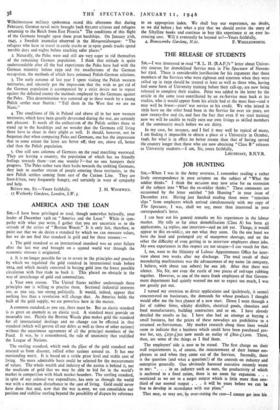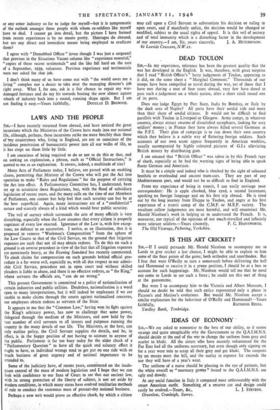JOB HUNTING
SIR,—When I was in the Army overseas, I .remember reading a rather lively correspondence in your columns on the subject of "What the soldier thinks." I think the occasion may now arise for an extension of the subject into "What the ex-soldier thinks." These comments are occasioned by the letter entitled "Job Hunting" in your issue of December 21st. Having just finished reading three more "rejection slips" from employers which arrived simultaneously with my copy of The Spectator, I was, shall we say, more than interested in your correspondent's letter.
I can bear out his general remarks on his experiences in the labour market. My tally so far since demobilisation (Class A) has been 43 applications, 14 replies, one interview—and no job yet. Things, it would. appear to this ex-soldia, are not what they seem. On the one hand we have the loud and prolonged cry of manpower shortage, and on the other the difficulty of even getting in to interview employers about jobs. My own experiences in this respect are not unique—I can vouch for that.
I, too, went to the Ministry of Labour Appointments Office for inter- view about two weeks after my discharge. The total result of their meandering machinations was the advancement of my name (in company, I believe, with about too others) for one job. After that there was silence. No, Sir, not even the rustle of two pieces of red-tape rubbing together. However, as one of the more frank employees of that Govern- ment department had quietly warned me not to expect too much, I was not greatly put out..
I turned my attention to direct applications and (guilelessly, it seems) concentrated on businesses, the demands for whose products I thought would offer me the best chance of a new start. Down I went through a list of rubber flints, Whisky distillers, electrical goods, chocolate and food manufacturers, building contractors and so on. I have already detailed the results so far. I have also had an attempt at buying a small business, but the prices of these nowadays are prohibitive to a returned ex-Serviceman. My market research along these lines would seem to indicate that a business which could have been purchased pre- war for, say, L250-L300 now needs an outlay of £800-D,000. These, then, are some of the things as I find' them. '
The employers' side is now to be stated. The first charge on their staff requirements is, of course, the reinstatement of their former em- ployees as and when they. come out of the Services. Secondly, there is the question (and what a question!) of the controls on industry and enterprise generally. One obviously harassed executive recently wrote to me: ". . . in an industry such as ours, the productivity of which is anchored to a fixed ration, there is no room for expansion . . . restricted- as we are to a target output which is little more than one- third of our normal output . . . it will be years before we can bt free to develop in accordance with our plans."
That may, or may not, be over-stating the case—I cannot get into his
or any other industry so far to judge for myself—but it is symptomatic of the outlook amongst those people with whom ex-soldiers like myself have to deal. I cannot go into detail, but the picture I have formed from recent experiences is by no means pretty. Shortages do abound, but are any direct and immediate means being employed to eradicate them?
I agree with "Demobbed Officer" (even though I was just a sergeant) that provisos in the Situations Vacant column like " experience essential," "copies of three recent testimonals " and the like fall hard on the ears of a September, 1939, volunteer. Previous experience and testimonials were not asked for that job.
I don't think many of us have come out with "the world owes me a living" complex nor a desire to take over the managing director's job right away. What I, for one, ask is a fair chance to repair my war- damaged fortunes and do my bit towards beating the now almost square wheels of industry back into a round, running shape again. But I am































 Previous page
Previous page